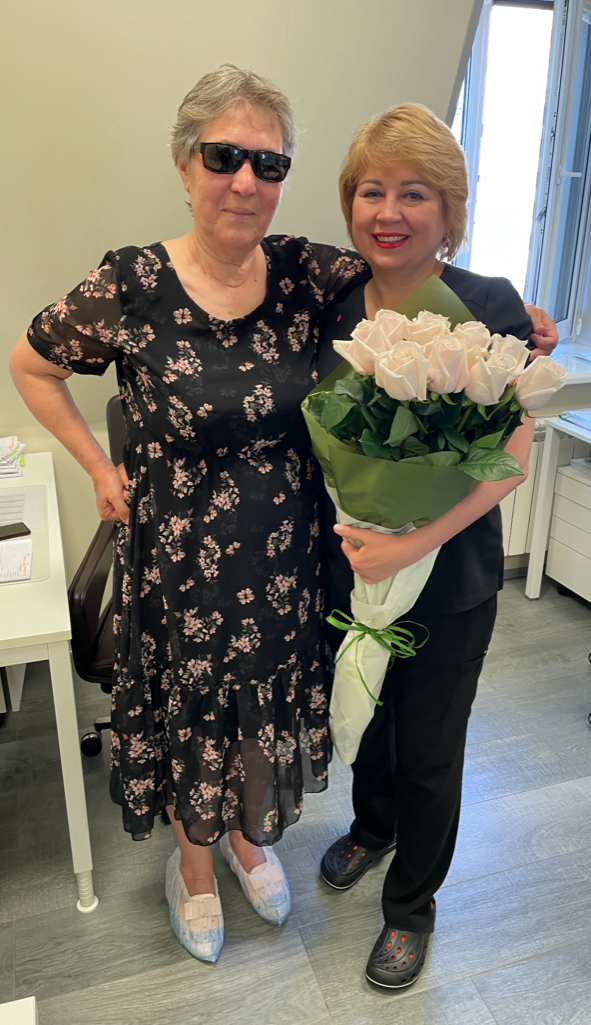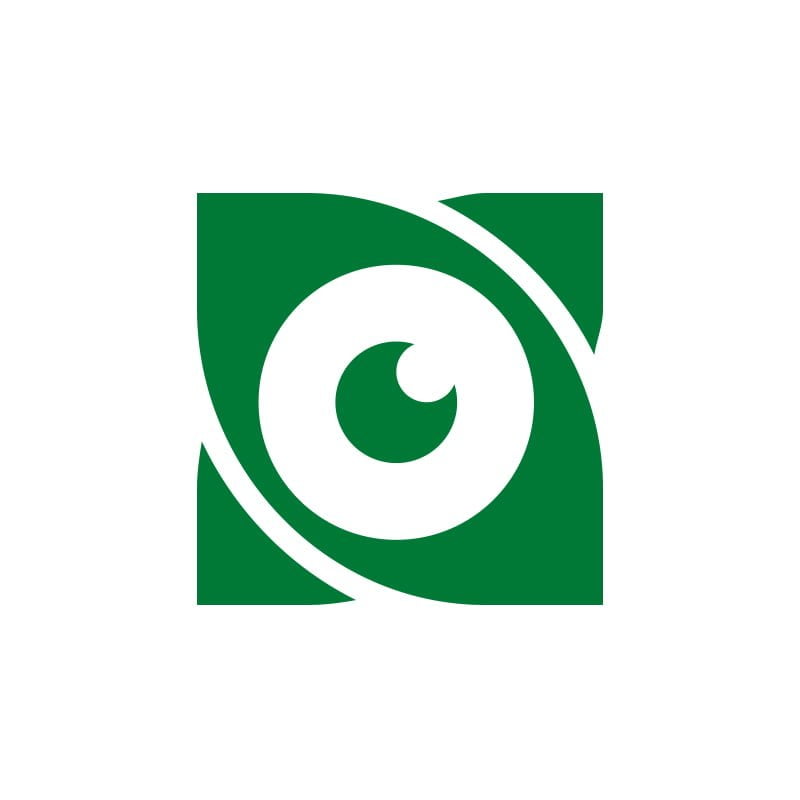- Services
- Keratoconus treatment
Keratoconus treatment
Keratoconus treatment by the BritishX method - first result in 12 minutes
Book consultation in our clinic
What are the dangers of keratoconus for you?
Keratoconus is a time bomb in your body. This non-inflammatory eye disease causes the cornea to degenerate and change its shape – it becomes thin and cone-shaped. The greatest danger of keratoconus to you is a significant deterioration in your vision. You may lose the ability to drive a car, and in severe cases – even to read.
The disease is accompanied by blurred vision, photophobia, itching, diplopia (double vision) and other symptoms that significantly impair your quality of life. Without proper treatment, the progression of the disease can lead to severe complications and require surgery, which is not always successful.
What happens if there is no treatment?
In most cases, the development of keratoconus leads to severe complications that pose a real threat to your health and visual acuity, up to and including complete loss of visual function. Such complications include:
- Astigmatism
- Diplopia
- Corneal drops
- Corneal tear
- Loss of vision
If you don’t take immediate measures or use ineffective treatment, your body will inevitably develop powerful pathological processes which will lead to serious visual impairment. Violation of corneal integrity can cause irreversible consequences in the tissues of the eye and lead to complete loss of vision. Only adequate and timely treatment can stop the process.
The main cause of keratoconus
Absolutely all processes in your body are controlled by the brain. Your brain cells receive information from all organs and systems, analyze that information, make the necessary reaction and send the appropriate orders to the various organs of your body via your nerve cells.
Keratoconus (like any other disease) is caused by a combination of various factors. These factors cause certain parts of the brain to malfunction and disrupt neural connections. In other words, the brain stops giving the “right” orders for your visual system to work properly, which leads to keratoconus, and then to the more serious consequences mentioned above.
How to defeat keratoconus as quickly as possible?
In the 21st century, there is an effective and safe method of treating keratoconus. It is cross-linking, or cross-linking of corneal collagen molecules. The method turned out to be a lifesaver for eyesight and the ability to lead an active life – as a rule, patients with keratoconus are young people under 40-45 years of age. Cross-linking was invented in Switzerland and is based on irradiation of the cornea with ultraviolet light flux previously impregnated with riboflavin. The depth of exposure to ultraviolet light is strictly dosed. The result is consolidation of the cornea, stopping its stretching. Thus, the disease is stopped. Then there is a gradual flattening of the cornea, which manifests as improvement in visual acuity.
We strictly follow the traditions of European medicine. The treatment is performed using original equipment, developed by Theo Sailer, the author of the cross-linking method, Swiss ophthalmologist. The BritishX method was developed by British scientists using a special standard that regulates the exposure time of the device and the medication to be applied. This method is only available at the British Ophthalmological Center. Our specialists, who introduced the method over 12 years ago, have been trained in the European Corneal Pathology Departments. Our doctors have successfully treated more than 28,000 patients with keratoconus in Ukraine, Baltic states, Europe and Great Britain. We use modified Theo Sailer’s methods, allowing to minimize the time of UV exposure to the cornea. This makes it possible to speed up restoration of patient’s well-being after corneal cross-linking procedure for keratoconus, as well as for other types of pathological corneal thinning. We use only original riboflavin solutions in the treatment of keratoconus.
The result of our work is the cessation of disease progression in all patients. Gradual improvement of vision is observed in 99.5% of patients treated with the BritishX method.
An important factor of success is the timely and correct diagnosis of keratoconus. British Ophthalmological Center ‘s equipment makes it possible to diagnose Keratoconus with high probability at the earliest stages.
Our keratoconus diagnosis and treatment methods and approaches have preserved vision and active lives for a huge number of young people in Europe. We offer the best of modern ophthalmology to our patients!
Відгуки пацієнтів
British Ophthalmological Center

Ryabokin Olga Hryhorivna
Cataract Treatment
Dear Vita Kostyantynivna! Sweet, gentle, fragile. Thank you for your strong, confident hands. Your professionalism, talent. For your good heart. You brought me back to a full life. I am sincerely grateful to you.

Chernenko Nadiya Panteleymonivna
Cataract Treatment
I, Chernenko Nadiya Panteleymonivna, had a lens replacement surgery on 11.12.2024 (left eye) and 17.12.2024 (right eye). I would like to express my gratitude to all the staff of the center, namely: the receptionists, nurses, optometrists, doctors and everyone else who works here.
A big bow to everyone.
I am especially grateful to Ophelia Petrosova. She is very attentive, sweet, loving and positive.
Peace and kindness, sincerely N.P. Chernenko.

Kobylyanskyy Vitaliy Oleksiyovych
Cataract Treatment
Over the course of 3 months, I underwent an operation to remove cataracts from both eyes at the "British Ophthalmological Center". The result of the operation is excellent and optimal for my age (82 years). I sincerely thank doctor Zhuk Andrii Mykolayovych for his golden hands and sensitivity. I really liked the organization of the entire treatment process at the British Ophthalmological Center.
Frequently Asked Questions:
Keratoconus is a progressive disease of the cornea, in which it gradually thins and assumes a cone-like shape, leading to vision impairment. A doctor can diagnose this condition after a comprehensive eye examination. Our advanced equipment allows us to detect the disease at its early stages with maximum precision.
Preparation for a corneal cross-linking procedure is a critical step to achieve the best results and minimize risks of complications. You should stop wearing contact lenses three days before the procedure and follow the prescribed eye drop regimen provided by your doctor. This ensures sterility, reduces the risk of infection, and prepares the cornea for the procedure. On the day of the procedure, do not plan to drive, avoid using eye cosmetics, and abstain from alcohol for 24 hours before the operation. Bring sunglasses and dry tissues with you.
On the day of the operation, you may spend up to two hours at the center.
During the first two to three days after the procedure, you may experience discomfort, such as a foreign body sensation, foggy vision, or tearing. A bandage contact lens is applied to the eye and is usually removed 4-5 days later during a scheduled follow-up visit.
During the initial recovery days, avoid:
- Rubbing your eyes,
- Using eye cosmetics,
- Allowing water to enter your eyes,
- Engaging in intense physical activities or sports,
- Exposure to drafts or dry air, as they can cause discomfort and delay healing.
Wear sunglasses outdoors during the first week after the procedure. For the first month, avoid swimming pools, saunas, and open water swimming to prevent infection or eye irritation.
Cross-linking is not designed to directly improve vision but rather to halt the progression of keratoconus and stabilize the cornea. Vision improvement after cross-linking is possible but not guaranteed. Some patients, especially those in the early stages of the disease, may experience vision improvement within a few months post-procedure.
In most cases, cross-linking is a one-time procedure and does not need repetition. It aims to stabilize the cornea and stop the progression of keratoconus. However, for some patients, particularly if the disease continues to progress after the operation, a second procedure may be required. The decision for a repeat procedure is made solely by the doctor after a thorough eye examination.
A postoperative follow-up is usually conducted 3-5 days after the procedure to remove the soft contact lens and evaluate the healing process. Further visits are scheduled individually by the doctor based on the patient’s condition.